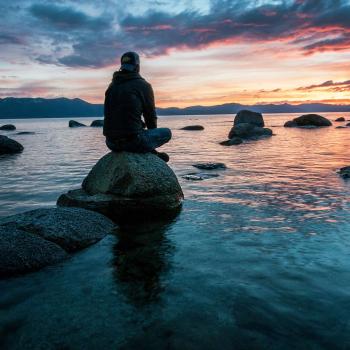We are spiritual beings having a human experience. ~Pierre Teilhard de Chardin
Did you used to go to a church, synagogue or mosque, only to find you couldn’t relate to the stale traditions and centuries-old dogma? Do you still consider yourself a spiritual person?
If you answer yes to these questions, you probably classify yourself as “spiritual but not religious” (SBNR)—and you may also feel there’s a void in your life. You have a spiritual yearning at your core that often goes unfulfilled, a thirst that isn’t quite quenched. You may have even tried to satisfy that yearning by trying new houses of worship, only to come up empty.
The key to satisfying this deep-seeded spiritual yearning is to start your own spiritual practice. This practice doesn’t replace religion, it is your religion and involves engaging in a series of regular activities that both enrich your spiritual awareness and feed your soul. It can be the difference between a satisfying life or one where it feels like something integral is missing.
In the book A Religion of One’s Own, Thomas Moore, the former priest and author of Care of the Soul, lays out a blueprint by which you can develop your own spiritual practice and set of rituals you can partake in on a regular basis. It’s Moore’s belief that “we need a new way to be religious, a really new way. A way that honors the traditions of the past but moves on.”
This starts by taking a hard look at your daily schedule and carving out time to accomplish specific, simple tasks or mini-rituals throughout the day. These activities can both ground you and remind you that there is more to life than our daily chores or work. Moore explains it like this:
Instead of just letting your days unfold spontaneously or being at the mercy of an inflexible busy schedule with family and work, you might set up a few regular activities, like meditation before breakfast, listening to music before lunch, being quiet after 10 p.m., eating simply in the morning and taking a quiet walk afterward.
What follows is a summary of the main tenets found in A Religion of One’s Own, a 10-point list provided by Moore with my thoughts following in italics. It lays out the keys to developing your own spiritual practice and offers a glimpse of what a “spiritual but not religious” life can be.
1. Meditate. Learn a formal way of meditating, or be contemplative in nature, alone, at work, or at home.
Meditation is easier than you think and in its most basic form centers around one key idea: Breathe. During our harried lives, we often begin to breathe shallowly, taking short breaths. Whenever you feel stressed, or sense that life is moving too fast, remember to b-r-e-a-t-h-e. Try it now. Take a deep breath. Repeat.
2. Live ethically. Do no harm and make your life a positive contribution to humanity. Work ethically for ethical companies or organizations. Change work if necessary. At least, stay on track toward a highly moral life work.
I don’t have to tell you there’s a lot of bad stuff going on in the world today. It can be hard to figure out how you can personally have an impact. To get started, think small. Focus on the modest acts and activities you can do, in your home, neighborhood and workplace, to make the world a little bit more caring, a little bit better.
3. Live responsively. Read the signs for who you are to be and what you are to do.
There’s a centuries-old devotional exercise call examen that involves “discerning God’s direction.” Each evening, at bedtime, reflect on the day’s events and ask yourself two questions: When was I most alive today? When was I most drained today? Find out what in your life brings you closer to God (a happy place) and which actions take you further from God (an unhappy place).
4. Have a dream practice. Dreams give you strong hints about what’s going on and how you can adjust. Without them you have no guidance but your own consciousness, which is too limited.
Keep a dream journal next to your bed where you can jot down your dreams. They can sometimes give you a glimpse into a deeper part of yourself, illuminating your hopes, desires or deep-seeded concerns. To help remember your dreams, before your head hits the pillow, hold a pen and pad in your hands and declare “I will remember and write down my dreams the moment I wake up.” Place the pen and pad in an easy to reach place and see if the alternate reality of dreamland is trying to tell you anything.
5. Be a mystic. Expand your sense of self through art and wonder. Achieve special states of awareness. Have a greater sense of self through losing yourself.
This doesn’t have to be complicated. You can be a mystic this evening by sitting outside and gazing up at a sky full of stars. Or by rising early in the morning, when your home is dark and quiet, and engaging in contemplation. Or by spending an afternoon taking a long, slow trek through an art museum, even if that museum is online.
6. Be intimate with nature. Especially take daily note of the sky: sun and moon, clouds, weather, planets, stars. Learn from animals. Be astonished by geology and plant life.
Getting closer to nature means you need to get outside and move. Depending where you live, this may involve a walk through a park, around a lake, along the ocean. As you walk, be perceptive, take in the trees, notice the rhythmic movement of any water, tune in to the sounds and activities of the native wildlife. Open your senses wide.
7. Be a monk or monkess. Adapt monasticism of any variety to your daily life and to the world in which you live. Spend time carefully. Read deeply. Study. Honor the book, good food and community.
Be especially aware of time and how you use it. Could some of the time you spend mindlessly scanning social media be better spent satisfying the needs of the soul? Read a book or listen to a podcast by someone who inspires you, cook an intricate meal you’ve always wanted to prepare, engage in a long conversation with an old friend, not just talking, but really listening.
8. Aim for bliss. Not superficial happiness or possessions or wealth. Not entertainment. But bliss: knowing you are in the right place and doing what you are meant to do.
Happiness is often found not in our own self-centered actions, but by reaching out to, connecting with, and helping others. When we give to others, we usually receive even more in return.
9. Develop a philosophy and theology of life. Think about your life. Work out some principles for yourself. Don’t follow the crowd. Take the road less taken, the narrow gate, the path you see behind you.
Find your own personal path, one that’s not dictated by society or family. Your path will be associated with a special gift or talent you have. As David Spangler said, “We all possess a gift or talent that we are attracted to and enjoy doing…this gift ultimately connects us to others.” Or as I heard someone recently say, we all have at least one superpower. What is yours?
10. Learn from the world’s religions and spiritual traditions. You don’t have to join or believe. Find insights and methods and beautiful expressions and images. Don’t separate secular from sacred. Make your own collection of truths and art works.
Read the works of the great spiritual leaders. If you were raised a Christian, read about Buddha. If want to read about Jesus’s true message (as not found in the Bible), check out The Gnostic Gospels by Elaine Pagels. Read the Kabbalah as explained by Daniel C. Matt. Build your own spiritual library, one you can go back to again and again.


















